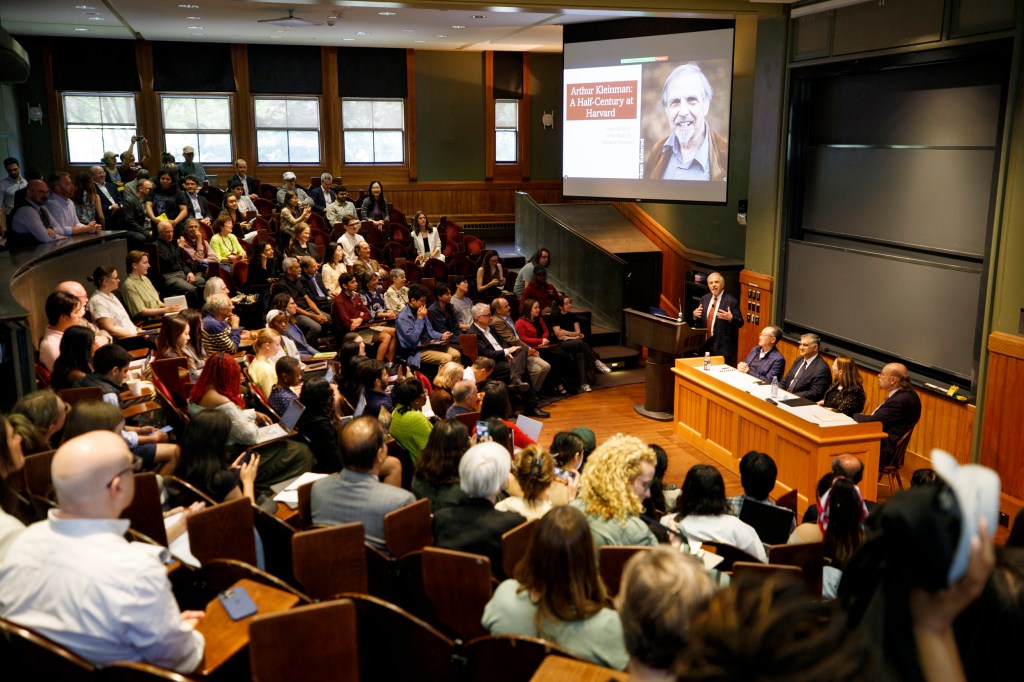A long career bridging medicine, social science, and the humanities has left Arthur Kleinman with one critical insight.
“Care, critically understood and practiced, matters most,” he told a packed lecture hall last week. “This is at the center of whatever claim I can make to wisdom and truth.”
Kleinman, M.A. ’74, a psychiatrist whose many titles include Esther and Sidney Rabb Professor of Anthropology, plans to officially retire next year after a total of nearly 50 years at Harvard. But his work in the classroom ended Tuesday with the final meeting of his “Future of Medical Anthropology” seminar.
The occasion drew nearly 200 current and former students to Sever Hall, with dozens more joining via Zoom. Five former students also testified to Kleinman’s impact as a teacher, author, mentor, and moral anchor committed to building cross-cultural understanding and advancing well-being.
“The gift that he leaves us with is the idea that knowledge is not only linked to patents and businesses,” offered Adams House Faculty Dean Salmaan A. Keshavjee, Ph.D. ’98, who also serves as director of the Center for Global Health Delivery at Harvard Medical School (HMS) and professor of Global Health and Social Medicine in the Department of Global Health and Social Medicine (GHSM). “It’s linked to a better understanding of how to improve the human condition.”

Kleinman, who is also a professor of medical anthropology in GHSM and professor of psychiatry at HMS, first landed at Harvard with his wife, Joan, in the fall of 1970. With support from the National Science Foundation, the Stanford-trained M.D. came to do a comparative study of medical systems across cultures.
“I quickly figured out that for me, anthropology was a suitable way forward,” Kleinman explained.
He taught Harvard’s very first course in medical anthropology in 1973. He left in 1976 for an associate professorship at the University of Washington, but the expert on health care in Chinese culture was back in Cambridge by 1982, now in a senior position split between the Faculty of Arts and Sciences and HMS.
“And that is the position I will be retiring from in July 2026 when I formally retire, and from which today — 43 years later — I deliver this, my final lecture,” Kleinman said.
He honored the contributions of the late Harvard social medicine/psychiatry professor Leon Eisenberg and former students including the late Paul Farmer, M.D/Ph.D. ’90, the celebrated co-founder of Partners In Health. Kleinman also name-checked a long line of staffers and faculty assistants who over the decades helped build the medical anthropology program.
“We’ve had about 100 doctoral students, 25 of whom are M.D./Ph.D.’s; more than 250 postdoctoral fellows, including researchers from much of the world; over 50 M.A. students; dozens of students from the Chan School of Public Health and other Harvard Schools; hundreds of medical students; and thousands of undergraduates,” he said.
Veterans of the program praised more than Kleinman’s intellectual rigor and moral mentorship. His influential body of work also figured prominently. In the final class, former World Bank President Jim Yong Kim, M.D. ’91, Ph.D. ’93, who co-founded Partners In Health with Farmer, testified to the career-altering discovery of Kleinman’s “Patients and Healers in the Context of Culture” (1980).
Anne E. Becker ’83, M.D./Ph.D. ’90, the Medical School’s dean for Clinical and Academic Affairs and its Maude and Lillian Presley Professor of Global Health and Social Medicine, spoke to the inspiration provided by “The Soul of Care” (2019), Kleinman’s account of navigating the healthcare system as a family caregiver from Joan’s Alzheimer’s diagnosis until her death in 2011.
“This book has become my touchstone as a clinician — and quite frankly, in my responsibilities as an educator, mentor, and colleague,” Becker said.
Source link

